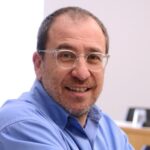Hazon will be in the Celebrate Israel Parade in New York this Sunday, riding bicycles alongside our Topsy Turvy Bus. Many people would not mind if we were not there; it’s 2016, nothing about Israel is uncontroversial, and for a growing number of Jewish leaders and institutions it is easier to change the channel.
But I like the Sheryl Sandberg notion of leaning in. I think it’s intuitively right. And it applies to Israel, it applies to the Celebrate Israel Parade and it applies to what Hazon is trying to do more generally in relationship to Israel.
Each one of us reading this has our own Israel history, our own Israel relationship, our own values, our own set of questions. Mine is pretty wide, though not necessarily wider than anyone else’s. I had a traditional Jewish education, and bounced against it. I was provoked by anti-Zionism in undergrad in England, and bounced against it. At Georgetown I overlapped with Hisham Sharabi and Jan Karski, and learned from both. I finished my MA at Hebrew U, and the best class I ever took in 20 years of full-time education was Jeremy Milgrom’s Politics and Religion in Jerusalem – visiting Jewish settlers and Palestinian leaders, Faisal al-Husseini and Menachem Froman z”l and everyone in between. A few years later I drove into Issawiya during the first intifada, which was a considerable mistake. We were luckier than the Israeli soldier who took an equivalent wrong turn and was burned to death in his car a couple of weeks later. In the nineties I helped to found New Israel Fund in the UK. In the oughts I sedered with Marla Bennett, z”l, in the year in which she was murdered at Hebrew University. And since 2003 we’ve partnered with the Arava Institute for Environmental Studies on our Israel Ride, so I’ve had the chance to meet with Palestinians (ie from Judea and Samaria, aka the West Bank, aka Palestine) and Israeli Palestinians (ie Arab citizens of Israel who – in my experience at least – have become steadily more radicalized in the time I’ve had the chance to talk with them).
For this range of experiences I consider myself exceptionally lucky. It is all very well to talk in the abstract about “shivim panim l’Torah” (seventy faces of the Torah); it is much harder to engage with real people in a wide range. I hold contradictory views, pretty much simultaneously. (Yes: I do indeed disagree with myself J). But I feel rock solid in engaging with Israel. I love Israel, I don’t love it uncritically, and I want both to defend it against unfair attacks, and to help it – insofar as I can – to be its best self, which includes trying to fix some of what is wrong. And this is not only the work of organizations whose sole focus is Israel; it’s important to be able to do this work within a wider frame.
We see this clearly both in last week’s Torah portion and this week’s. Shmita and yovel, the sabbatical year and the jubilee, are inextricably tied up a/ with the land of Israel and b/ with some of the greatest challenges of our time – inequality, relationship to land, relationships to debt, definitions of community, and so on.
So Hazon works to strengthen American Jewish life, and to point outwards to help create a more sustainable world for all. And as part of this, we want to make a difference in Israel, if we can, and to strengthen the Israel/diaspora relationship, which necessarily means deepening and complexifying it. Our Israel Ride and our other programs – Siach, our Israel Sustainable Food Tours, our Hakhel work on intentional community – all open up relationships with real Israelis, struggling with real challenges and yet working, day in and day out, to create a healthier and more sustainable Israel, and a better world for all. This week saw the conclusion of our first birthright tour, which included a day at the Arava Institute. It’s the first time a birthright bus has ever gone there, and we hope it’s not the last.
So: I celebrate Israel in its greatness and its challenges and its contradictions. There will be a presumption in some circles that the Celebrate Israel Parade will be “right-wing” or “orthodox” or some other epithet that is intended to signify narrowness. To which, paraphrasing Burke, I would simply say: the only thing necessary for the parade to be “right wing” is for those who think of themselves as not right wing, not to attend. (Forgive all the double negatives in that sentence – but you get my point.)
One last thing to think about, from a wise friend of mine: criticism of a country, no less than of a person, happens most effectively from a place of love and of breadth. Our relationship to Israel shouldn’t be defined either by criticism (on the “left”) or defense (on the “right.”) It should be a broad and nurtured relationship, interweaving friendship and travel, learning and food, exercise and newspapers and language and conversation and music and art and the great panoply that goes with the extraordinary story that is Israel. And within that we should defend or criticize Israel – or defend and criticize Israel – but knowing that our defense or our criticism is a part of our relationship and not the totality of it.
Today is the 40th day of the omer, hod she’b’yesod. That’s a little hard to translate and hard to parse. But yesod is something about fundamentals, underpinnings, a core, something elemental. And hod is a kind of humility that contains the essence of beauty. So today is a day, amongst other things, to think about what is core and elemental in our relationship to Israel, and what beauty might come to light if we bring humility and openness.
